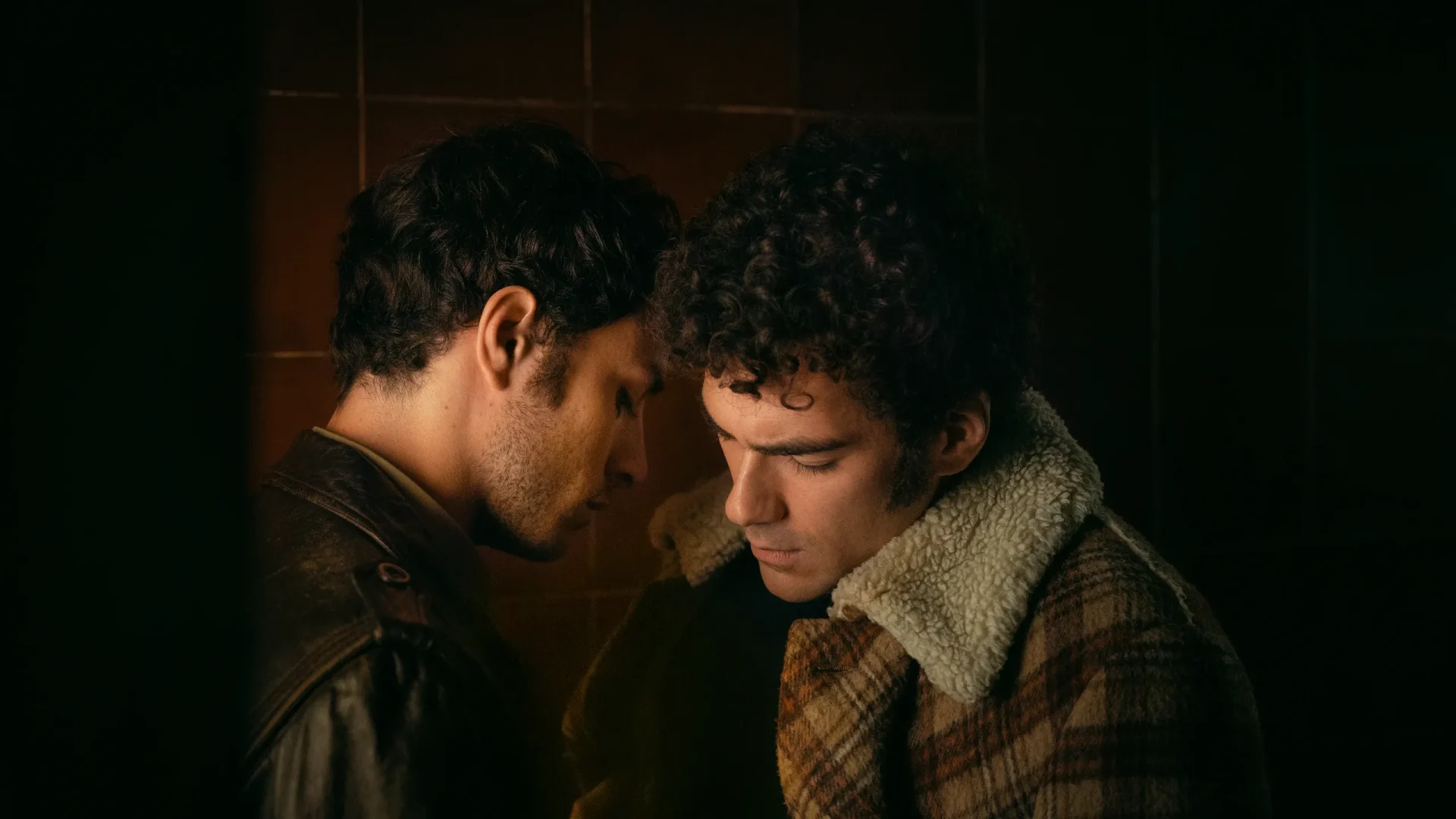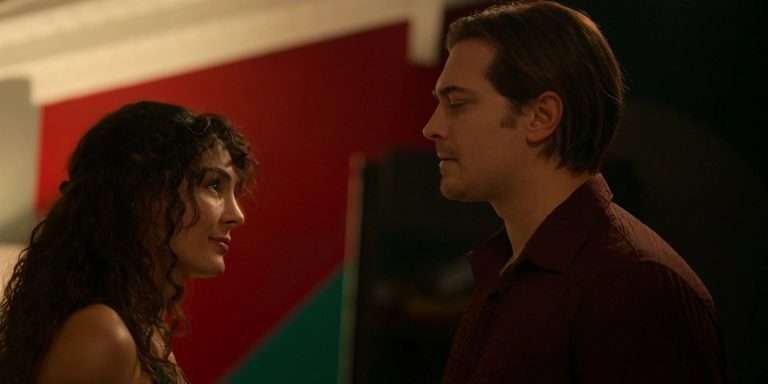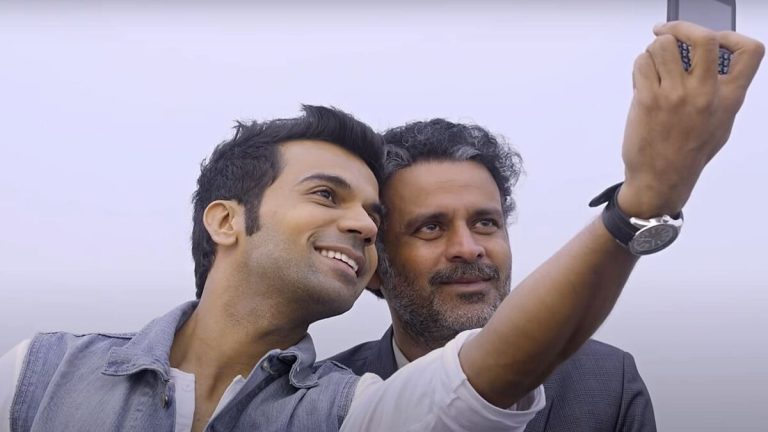Enea (Damiano Gavino) and Pietro (Andrea Di Luigi) meet for the first time on a movie set, as the former ushers a crowd away from the scene as it’s being performed. They lock eyes, and you can tell it’s love at first sight. The crowd then jostles Pietro away, but the viewer knows he’ll be back. Such is the level of predictability that afflicts Nuovo Olimpo, the latest film from Turkish-Italian film director Ferzan Özpetek. The director is a Cannes veteran (his debut feature, Hamam, actually premiered at the prestigious festival in 1997), and this film marks his first collaboration with Netflix. Unfortunately, as has been proven by countless streaming films over the past half-decade, the freedom that comes with Netflix has more cons than pros attached to it.
The most prominent of the advantages, of course, is that filmmakers are able to work on projects that they are passionate about, and that’s definitely the case here. Working off a script he co-wrote with Gianni Romoli, director Özpetek is clearly covering very personal ground. The opening titles declare that the film is ispirato ad una storia vera – Italian for “based on a true story” – and the main character is a filmmaker who grows in stature and fame as the runtime progresses. The ensemble is obviously inspired by Özpetek and the people in his life (a fact compounded by a dedication displayed during the end credits), and the entire thing is quite meta-cinematic in how it comments on itself (more on that later).
Let us first get into the story: we kick off in 1978, the year Enea and Pietro first met. The former is an artist in training, assured and confident in his approach to his work and his relationships. Pietro, on the other hand, is an uptight medical student and more hesitant to act on his obvious attraction to Enea. The first act of the film follows the pair as they attempt to court each other, with the more experienced Enea coaxing his shy lover out of his shell. It’s sweet enough, and there’s a slight undercurrent of shame to Pietro’s shyness that communicates the way in which society makes it difficult for these two men to love each other.

Their timing is also unfortunate, as their relationship blossoms into a romance just as some vaguely defined political upheaval strikes the city of Rome. The two are forcefully separated as a result and unable to find each other in the chaos. What follows is a long-winded tale in which Enea and Pietro go their separate ways without ever quite forgetting about each other. Pietro keeps track of Enea’s success-laden film career, as well as his relationship with another man. Enea channels his obsession in his work, directing films that recreate scenes from his short-lived romance with Pietro.
This is where Nuovo Olimpo nearly strikes some level of cleverness, as Özpetek directs Enea, who is also directing a third, unnamed actor. However interesting that metatextual layer might be, it’s betrayed by the fleetness of the project overall. The script for this film contains three different time skips, and each one comes far too soon. We’re unable to appreciate the immediate emotional fallout of Enea and Pietro’s separation, for example, before being whisked away to another decade.
While it’s unclear how much of this film draws from real life, the recreation feels inconsiderate of the audience – while Özpetek might feel moved by these recreations, he neglects to remember that his audience does not have the same level of nostalgia for them as he does. In his recreation of events, he does not provide enough detail or cover enough emotional terrain. The underlying theme of how art allows love to bloom and then builds upon it is lost in the process.
This is not just the fault of the writing, however, as the craft here is quite mediocre. The picture relies heavily on the cultural capital of Rome and does not have anything close to what you would call a memorable image. Coverage is light, and the entire film passes in a flurry of medium shots – visual variety or intent is sorely lacking. You would hope that would change in the film’s handful of sex scenes, but they’re utterly unremarkable. The only thing notable about them is their casual usage of full-frontal nudity, which Özpetek lazily applies thanks to the freedom provided to him by Netflix. On a craft level, there is very little here to comment on. A climactic pan that’s both wistful and romantic is about the only thing of interest here.
Also, Read: Once Upon a Star (2023) Netflix Movie Review
By about the halfway mark, you will be wondering what contrived plot device Özpetek could possibly apply to reunite Enea and Pietro, and the answer is a very contrived plot device. While I will not spoil it for you here, the last act of this film is practically a soap opera, straining to spin a bittersweet reunion that falls comically flat. It’s a pity that it ends where it does, as the central performances by Gavino and Di Luigi are genuinely heartfelt. To make the viewer feel like there’s genuine love between the pair in a film as lazily constructed as this one is an immense task, but these two manage it. They have just been let down by a director phoning it in, unbridled by the freedom that Netflix provides without enough inspiration to chart the emotional territory properly.
★½
Nuovo Olimpo (2023) Movie Information
External Link: Rotten Tomatoes
Genre: Drama
Original Language: Italian
Director: Ferzan Ozpetek
Producer: Tilde Corsi, Gianni Romoli
Writer: Ferzan Ozpetek, Gianni Romoli
Release Date (Streaming): Nov 1, 2023
Runtime: 1h 51m
Distributor: Netflix





![The Disciple [2020]: ‘TIFF’ Review – A deeply moving character drama about the arduous journey of a failed artist](https://79468c92.delivery.rocketcdn.me/wp-content/uploads/2020/09/The-Disciple-Movie-Review-highonfilms-768x321.jpg)
![The Thief of Bagdad [1924] Review – A Wildly Entertaining Silent-Era Spectacle](https://79468c92.delivery.rocketcdn.me/wp-content/uploads/2020/06/The-Thief-of-Bagdad-1924-768x432.jpg)